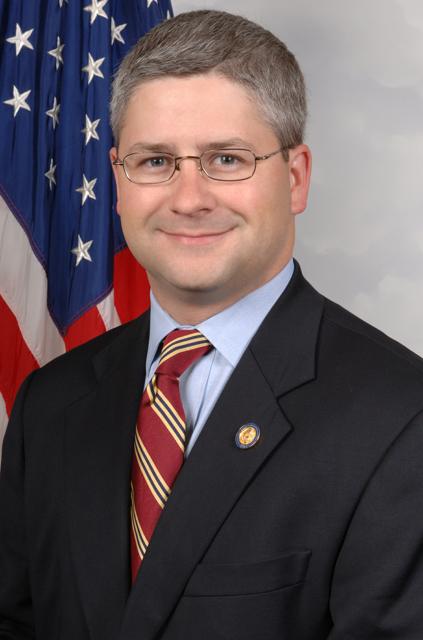Republicans have fired the first round in the latest edition of the political turf war that predictably erupts every 10 years in the wake of the U.S. census. And the proposed new congressional districts could make it very difficult for a Democrat to represent Asheville and Buncombe County in the U.S. House, says Roger Hartley, director of Western Carolina University’s Master of Public Affairs Program.
Released July 1 by the first Republican-controlled General Assembly in 140 years, the plan shifts almost all of Asheville’s reliably Democratic voters from the 11th District, currently represented by Democrat Heath Shuler, to the conservative 10th, presently the domain of Republican Patrick McHenry.
The political goal, says Hartley, is to siphon off enough Democrats from Shuler’s district to make him vulnerable while maintaining McHenry’s solid base in the 10th. “These maps are fantastic for Republicans,” he asserts. “They’ve drawn the districts in a way that they’re going to have opportunities to get both seats.”

Critics say it’s a blatantly partisan move that ignores traditional geographic, cultural and economic boundaries. Yet many observers believe the new lines meet the legal requirements, leaving opponents unsure how to combat what Hartley calls “the loss of … the political map for a decade.”
Radical surgery
By slicing out the district’s progressive heart and splicing in voters from the more conservative Burke and Caldwell counties, the proposal takes 8,875 registered Democrats out of the 11th and adds 26,519 Republicans — significantly more than the 20,708 vote margin by which Republican challenger Jeff Miller lost to Shuler last year.
In response, Shuler’s camp fired off a defiant statement. “This is the partisan and politically gerrymandered map we expected,” spokesperson Andrew Whalen declared. “Shuler is running for re-election in 2012 and looks forward to continuing to fight for all the working families of WNC.”
But rumors continue to circulate concerning Shuler’s interest in the vacant position of athletic director at UT-Knoxville, the former NFL quarterback’s alma mater. And “Shuler’s camp,” the website Politico noted June 29, “isn’t exactly pushing back on [those] reports.”
At a July 7 public hearing on the redistricting, the congressman’s team distributed talking points that said: “This proposed map does not let voters choose their representatives. Instead it is letting representatives choose their voters.”
Asheville City Council member Cecil Bothwell, who plans to challenge Shuler in the Democratic primary whichever way the lines are drawn, echoed his opponent’s supporters at the hearing. “Carving Asheville out of the 11th District is completely irrational,” Bothwell declared. “Those legislators … have forgotten that the Eastern Continental Divide separates their homes from ours.”
The new maps place Bothwell’s own home outside the district he’s looking to represent (he’s said he’ll consider moving into the new 11th if the maps become law). Shuler’s current congressional and campaign offices would also fall outside his district.
Mixed messages
Meanwhile, the proposal seems to have encouraged some local Republicans.
Both Dan Eichenbaum of Murphy and Spence Campbell of Hendersonville declared their candidacy within days of the maps’ release, though neither man’s initial announcement mentioned the redistricting. Miller also said recently that he hasn’t ruled out another run.
Other local GOP leaders, however, have expressed mixed feelings. Buncombe Rep. Tim Moffitt joined his two Statehouse colleagues — Democrats Susan Fisher and Patsy Keever — in opposing the plan. He and Fisher, both of whom serve on the House Redistricting Committee, say they had no chance to help shape the maps. Fisher slammed the process as overly secretive, saying the maps came directly from the committee chairs, Sen. Bob Rucho and Rep. David Lewis, and their respective staffs.
In an interview last month, Buncombe County GOP Chair Henry Mitchell had opposed any congressional maps that would divide the county, but he’s since softened his tone.
“We don’t necessarily agree that it should be split, but we think that if it is split, having two representatives in Washington would be better than one,” Mitchell explains. “In the long run, it could help Buncombe County get more federal funding or more attention.”
But local Democratic Party Chair Emmet Carney doesn’t buy that argument. “I can’t see the benefit,” he observes. “By splitting our county in half for no rational reason, they’re attempting to minimize the voice of Buncombe. … It’s unreasonable to think that someone who represents Gaston County is aware of our issues. … Your congressman might need an atlas now to even determine if you’re in his constituency.”
David Gantt, who chairs the Buncombe County Board of Commissioners, agrees. “I think it will hurt county government, because neither representative would have any loyalty to Asheville and Buncombe County,” the Democrat maintains. “It’s clearly a partisan scheme. I don’t even think local Republicans I’ve talked to support this. We’ll see if the national party is running the General Assembly, because that’s what it boils down to.”
Meet your new congressman?
Against that backdrop, all eyes are turning toward Rep. McHenry of the 10th District. A deputy majority whip, the powerful four-term Republican also serves on the House Financial Services Committee. Elected to Congress at age 29 after a short stint in the Statehouse, McHenry quickly became a fair-haired boy of the modern conservative movement, hailed by the National Journal recently as the “most conservative member of Congress from North Carolina and the 17th most conservative representative in the country.”
Based in Cherryville, he’s enjoyed strong support in the district: Last year, McHenry demolished Democrat Jeff Gregory, collecting 71 percent of the vote.
True, the redistricting plan would add 35,511 Democrats to McHenry’s territory while cutting 11,393 Republicans, (the latter due mostly to moving Avery and Mitchell counties into the 11th). In the new 10th District, Democrats would actually outnumber Republicans 185,830 to 167,990.
But the plan would also bump up the number of unaffiliated voters, from 103,872 to 117,855. And historically, “All the unaffiliated voters break toward [McHenry],” notes Cliff Moone, the state Democratic Party’s 10th District chair. The area also holds “a lot of DINOs — Democrats in name only,” he reports.
This spring, Politico called McHenry “the point man in Congress for the state’s redistricting.” If this is true, it would seem highly unlikely that his district would be reconfigured to his disadvantage.
McHenry declined to be interviewed for this article. But in a recent press statement, he said: “Redistricting is a duty of the General Assembly. … If the map proposed by the General Assembly is approved, I would be honored to represent the people of Buncombe and Polk counties and provide them with the strong constituent service they deserve.”
Gantt, however, slams that notion: “I think it would be hard to get much out of Rep. McHenry because of history and his really harsh stance on things that mean a lot to people in the city of Asheville and Buncombe County.”
Moone, meanwhile, says he “welcomes the folks from Asheville into the 10th District,” even though he “doesn’t believe it’s a just rendering of the map.” The redistricting, he says, could backfire if Democrats have “a very strong and well-financed candidate who focuses on Mr. McHenry’s votes.” The congressman’s recent support for ending Medicare entitlements, notes Moone, could cost him votes among the area’s many retirees.

But Moone has no illusions about how hard that would be to pull off. “McHenry’s been very, very strong,” he emphasizes. “It’s been 40 years or more since a Democrat has won this district.”
Payback?
All sides say they expect the proposal to end up in court, as have Democrats’ redistricting proposals in previous years (see “Déjà Vu All Over Again” elsewhere in this issue). But Asheville City Council member Esther Manheimer, a Democrat who previously served as a redistricting lawyer when her party controlled the General Assembly, says she thinks the new 10th and 11th District maps are lawful.
“Just because they changed the district fairly radically doesn’t make it unconstitutional,” Manheimer explains. “It might be problematic from a common-sense standpoint but not from a legal standpoint.”
Carney, meanwhile, says his party is already plotting strategy. “If these maps sit, we’ll have to adjust. If we’ve been disempowered, we will have to regain that power,” he asserts.
Mitchell, however, says that despite his mixed feelings, Republican leaders based the maps on population growth more than partisanship, noting: “Overall, Republicans are pretty pleased with what they’re proposing. … Democrats gerrymandered the current districts to give them an edge.”
And based on her own experience, Manheimer concurs. “I think it’s unfortunate when any party in power abuses its discretion,” she notes. “And certainly, the Democrats are guilty of that. I understand that some of this is payback, and probably deservedly so.”
— Jake Frankel can be reached at 251-1333, ext. 115, or at jfrankel@mountainx.com.




A July 19 redraft of the congressional district proposal from the General Assembly strips more of Buncombe County from its long time home in the 11th – currently represented by Democrat Heath Shuler — and puts it in the 10th – currently represented by Republican Patrick McHenry.
More deets here:
http://www.mountainx.com/news/2011/latest_congressional_district_maps_strip_more_of_buncombe_from_the_11th/
And here’s Rep. Heath Shuler’s July 20 response:
“It is unfortunate that the Legislature has once again divided Buncombe County and separated it from the rest of Western North Carolina. Splitting the county and placing it in two Congressional districts does a great disservice to the entire region. The people of Buncombe County spoke clearly and loudly at the one public hearing, yet their wishes fell on deaf ears in Raleigh. I will continue fighting for all the working families of Western North Carolina.”
http://www.mountainx.com/blogwire/2011/shuler_splitting_congressional_districts_does_disservice_to_our_region
Take a video tour of Asheville’s newly proposed Congressional Districts:
http://www.mountainx.com/news/2011/video_take_a_tour_of_ashevilles_newly_proposed_congressional_districts
UPDATE: On July 20, the General Assembly reversed back to the original July 1 proposal for the 10th and 11th districts. So all the stats contained in the original article here are the most up-to-date.
They have a plan but because of the number of displaced Americans due to the recession not been entered into the re-districting equation they are going to fall.
Dems release an alternative plan July 25:
http://www.mountainx.com/news/2011/north_carolina_democratic_legislators_release_proposed_redistricting_maps
The GOP plan passed the NC Senate July 25:
http://www.mountainx.com/news/2011/controversial_redistricting_plan_passes_nc_senate
The General Assembly ratified the new congressional districts July 28:
http://www.mountainx.com/news/2011/controversial_gop_voter_district_plans_pass